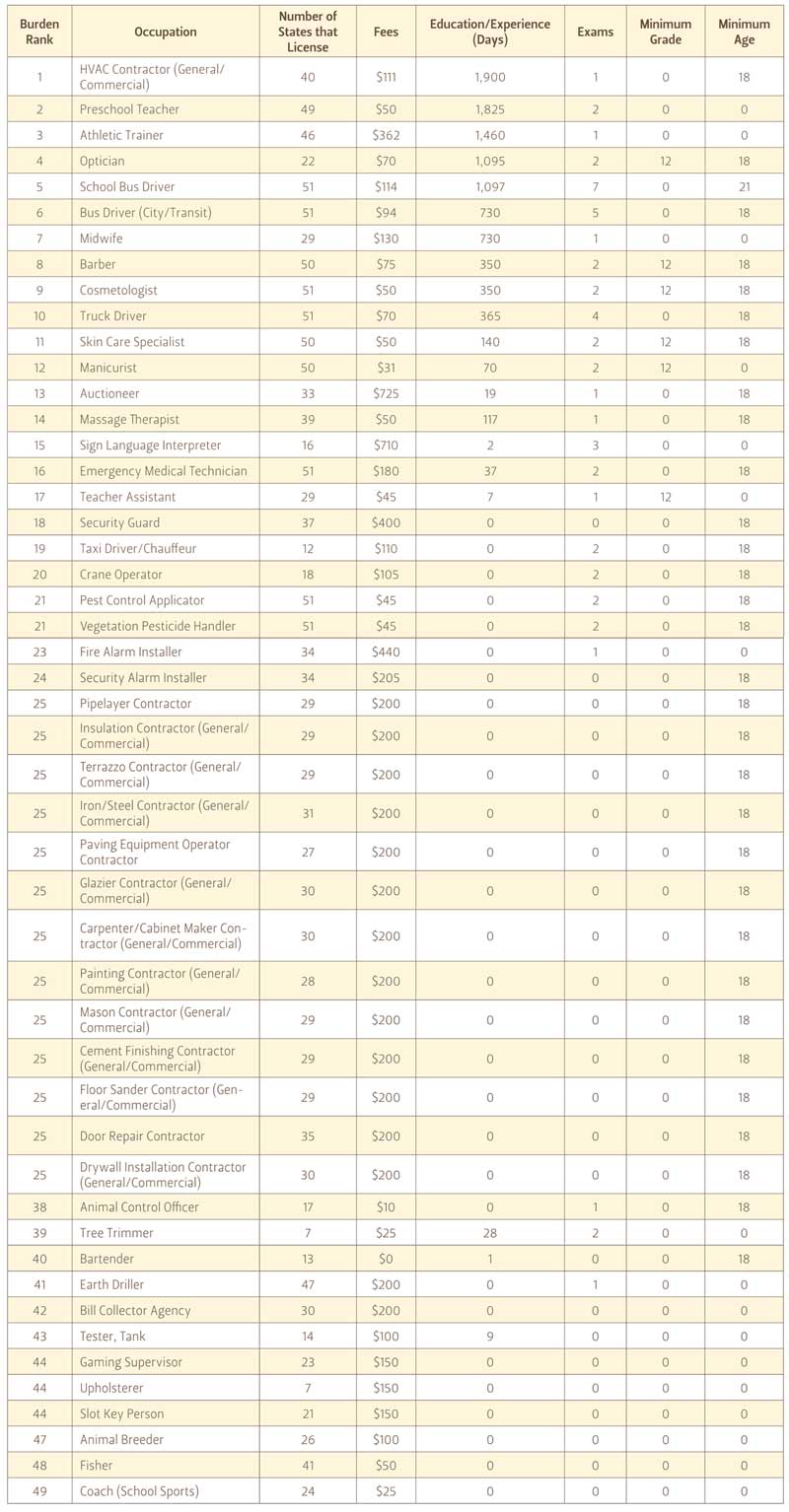Occupational Licensing Policies Hurt Low Income Workers in RI
Cosmetologists require 10 times more training than Emergency Medical Technicians
The state of Rhode Island has earned yet another poor grade in a national study of an important business category, illustrating how the state makes it more difficult and costly for low-income earners to embark on new careers. The study, released last week by the Institute for Justice (1) , measures regulatory burdens in the form of licensing requirements and fees for “low-income” occupations.
According to the study, Rhode Island licenses 49 of the 102 “low-income” occupations, which ranks the Ocean State with the 13th most burdensome regulatory system in the nation in this category and the 2nd highest burden in New England.
“This burden is especially harmful to many people who would prefer to start new careers and earn paychecks instead of receiving welfare checks,” said Mike Stenhouse, CEO for the Rhode Island Center for Freedom and Prosperity. “In most cases, landing a job should simply entail proving to the employer that you’re talented and honest. In too many instances, Rhode Island applicants also have to also prove themselves worthy to the state, by conforming to its arbitrary standards. Who’s really in charge of our lives?” inquired Stenhouse.
An “occupational license” is government permission to work in a particular field. To earn the license, the aspiring worker must clear various hurdles: earn a certain degree or type of education, complete specialized training, pass an exam, attain a certain grade level, pay fees, and more.
In the 1950s, only one in 20 U.S. workers needed the government’s permission to pursue his or her chosen occupation. Today, that figure stands at almost one in three.
In Rhode Island, under the guise of public safety, the state government took $732,298 from taxpayers in FY 2011 to fund the Department of Business Regulation’s Commercial Licensing and Racing and Athletics program (2) . The program oversees the licensing and regulation of myriad professions and trades, slapping fees and regulations on thousands of Rhode Island employers and workers. In many cases, the Commercial Licensing program governs the requirements necessary for employment in a profession, inhibiting some Rhode Islanders from pursuing the careers of their choice.
The Commercial Licensing program regulates real estate agents and appraisers, auto body shops, salvage yards, glass installation, upholsterers, auctioneers, liquor wholesalers, breweries, wineries, sewer-line cleaners, mobile-home dealers, trailer park operators, and health club workers as well as other businesses and professions.
Supporters of the Commercial Licensing program may claim that the organization has a role in keeping customers safe. In truth, the program creates a disincentive for competent workers to begin new careers or for employers to hire them, while forcing companies to raise prices for consumers across the state.
On average, prospective workers and employers in Rhode Island pay $164 in fees, lose about 211 days — about seven months — to education and experience, and take one exam. A handful of Rhode Island occupations require excessive training requirements compared with other states. For example:
- Rhode Island has the most burdensome laws for HVAC contractors, requiring over five years of experience. The average across licensed states is less than two-and-a-half years.
- Rhode Island is one of only eight states to require that truck drivers and city/transit bus drivers possess driver’s licenses for a year or more prior to licensure. It is also one of 20 states with a similar requirement for school bus drivers, and Rhode Island’s is among the longest, at three years. Other states require only tests, fees, a minimum age and in some states a short course or training session for these occupations.
Some of Rhode Island’s requirements also appear overly burdensome compared to other occupations that the state licenses. For example, it takes only 37 days of training to become an emergency medical technician, but nearly twice that time to earn a manicurist license. Barbers, cosmetologists, skin-care specialists and massage therapists must undergo even more training.
Rhode Island could expand employment prospects for many job-seekers by reducing or removing overly burdensome or needless barriers to low- and moderate-income jobs. Per the Competitiveness Report Card release for Rhode Island earlier this year by the RI Center for Freedom & Prosperity, the Ocean State already grades an “F” for overall Business Climate, with five Fs and one C- in related subcategories. The D- grade in this subcategory would further deepen the problem.
The following table shows the study’s analysis for Rhode Island.
The study also reveals the arbitrary and irrational nature of licensure across the nation:
- Most of the 102 occupations are practiced somewhere without government permission and apparently without widespread harm: Only 15 are licensed in 40 states or more, and on average, the 102 occupations are licensed in just 22 states — fewer than half. This includes a number of occupations with no self-evident rationale for licensure, such as interior designer, shampooer, florist, home entertainment installer, and funeral attendant.
- Licensure burdens often vary considerably across states, calling into question the need for severe burdens. For instance, while 10 states require four months or more of training for manicurists, Alaska demands only about three days and Iowa about nine days.
- The difficulty of entering an occupation often does not line up with the public health or safety risk it poses. For example, 66 occupations have greater average licensure burdens than emergency medical technicians. The average cosmetologist spends 372 days in training; the average EMT only 33. Such inconsistencies give good reason to doubt that many licensing schemes are necessary. These inconsistencies may reflect not the relative public health and safety risks of occupations, but instead the lobbying prowess of practitioners in securing laws to shut out competition. State policymakers should review current and proposed licensure schemes to determine whether they truly serve the public or instead fence out competition. As millions of Americans struggle to find productive work, one of the quickest ways legislators could help would be to reduce or remove needless licensure burdens.
End Notes:
(1) “License to Work”, Institute for Justice , 2012, http://www.ij.org/images/pdf_folder/economic_liberty/occupational_licensing/licensetowork.pdf
(2) State of Rhode Island and Providence Plantations. “Budget Fiscal Year 2012.” p. 67
The Institute for Justice is a nonprofit, public interest law firm that litigates to secure economic liberty, school choice, private property rights, freedom of speech and other vital individual liberties and to restore constitutional limits on the power of government. Founded in 1991, IJ is the nation’s only libertarian public interest law firm, pursuing cutting edge litigation in the courts of law and in the court of public opinion on behalf of individuals whose most basic rights are denied by the government. The Institute’s strategic research program produces social science and policy research to inform public policy debates on issues central to IJ’s mission.



Leave a Reply
Want to join the discussion?Feel free to contribute!